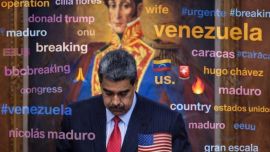Argentina’s approach to the political, economic and humanitarian crisis in Venezuela fell under heavy scrutiny this week, when one official criticised a landmark UN report reporting serious human rights violations.
The country’s ambassador to the Organisation of American States (OAS), Carlos Raimundi, stoutly defended the Nicolás Maduro regime on Tuesday, claiming that “Venezuela is besieged by and suffering from interventionism” and that “there is bias in the appreciation of what constitutes human rights violations in certain countries.”
Speaking to the OAS Permanent Committee monitoring the Maduro regime, Raimundi highlighted that Argentina “does not make an ideological reading of human rights, we concentrate on the person who suffers.”
His remarks were made in reaction to the recent report of United Nations Human Rights High Commissioner Michelle Bachelet, which detailed grave violations including the torture and slaying of political opponents.
Raimundi, however, implied that if the OAS was looking for political persecution, it might find a better example in Argentina’s previous government. “Unfortunately we live in a region where in various of our countries we have suffered the savage repression of popular demonstrations, judicial persecution accompanied by espionage and some very serious human rights problems,” he charged.
The Argentine ambassador admitted to “a critical situation [in Venezuela] with great economic pressures and nor am I unaware of the high number of people who have left that country.” He added that “we do not share certain perspectives as to the causes of that situation or the paths to resolve it.”
Raimundi spoke after his Mexican colleague who took a harsher view of the Maduro regime.
While not naming the United States directly, Raimundi criticised those countries which “block the main source of income, oil, and its reserves in London,” adding that reports denouncing human rights violations in Venezuela “should be seen in this context, [seeking to] create conditions for a situation of emergency and holding the government solely responsible for that emergency” while appealing to OAS members “to abandon the logic of stigmatising” Venezuela.
As for the solution, Raimundi said: “We are thinking more of supportive co-operation to guarantee a peaceful and negotiated way out.”
He also expressed doubts about the veracity of the human rights denunciations by saying that they did not agree much with what was reported by the Venezuelan legal authorities and that they were largely based on the testimony of Venezuelans abroad.
“You have to see both sides of the coin, those who have suffered from the blockade and sanctions and those expressing real or supposed human rights violations,” said Raimundi, also praising Maduro for freeing 110 political prisoners and being open to negotiation with those in the opposition agreeing to participate in the elections.
Pushback
The comments received strong pushback from the opposition, with Juntos por el Cambio calling for Raimundi’s removal as a representative of Argentina.
"We ask the national government for the immediate removal of Ambassador Carlos Alberto Raimundi, as well as a prompt and clear statement in favour of the aforementioned report and an explicit condemnation of the Venezuelan regime in relation to human rights violations," a group of coalition leaders said in a statement.
On Friday, Amnesty International Argentina called on the government to join the other member states of the UN’s Human Rights Council and condemn human rights violations in Venezuela. It also called on Buenos Aires to support an extension for the investigative independent team probing alleged violations.
Amnesty said the report revealed that Venezuelan officials and security forces had “planned and carried out serious human rights violations since 2014, including extrajudicial executions, forced disappearances, arbitrary detentions, and torture."
The NGO expressed concern over Argentina’s attempts to make the events appear “nuanced or relativised,” with the organisation’s Executive Director Mariela Belski saying the state should look beyond political loyalties.
“We are not talking about ideologies, we are talking about thousands of victims and their families who remain helpless in his search for truth and justice," said Belski. “If the Argentine State really care about the Venezuelan people and understands that local authorities have the responsibility for full respect for human rights in their country, it must demonstrate it."
By press time, Raimundi was walking back his comments, describing the UN report as “serious” and declaring that “Argentina cannot ignore the facts.”
He accused opposition media of launching “an operation” against him designed to discredit him and said he was talking about another report, not Bachelet’s one.
“Negotiated solutions must be found” and the “Venezuelan government should help to defuse this situation,” he said.
EU calls for delay
The European Union this week called for Venezuela to delay its December 6 parliamentary poll, saying that conditions now in place "do not allow for fair, democratic, competitive elections".
Staffers from Brussels' European External Action Service (EEAS) spent five days last week meeting figures from the government and opposition, including leaders Juan Guaidó and Henrique Capriles, as well as Church representatives and business leaders, the agency said in a statement.
A senior European official told AFP that the bloc is not confident that Nicolás Maduro's regime will push back the election by six months as the EU has urged.
"We're expecting a response within two weeks. After that, we'll consider it to be in the negative," the official said. "It is the time for bold Venezuelan-owned decisions in support of a peaceful and democratic transition.”
The EU does not recognise Maduro as Venezuela's president, supporting instead Guaidó, speaker of the National Assembly, the only democratically-elected state body in the country.
Currently controlled by the opposition, its members' seats will be in play at the December 6 election. The European official said the regime's objective at the polls is to reclaim the speakership from Guaidó.
The opposition in Caracas has split, with Guaidó at the head of around 30 parties who have backed a boycott of the polls. Capriles had called for voters to turn out en masse, but on Wednesday echoed the EU's calls for a delay on social media, citing the coronavirus pandemic. A third opposition group with closer ties to the regime has also urged high turnout and hopes to clinch large numbers of seats.
– TIMES/AFP/AP/NA


























Comments